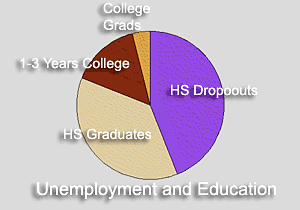|
|
|
Updated: 05/13/2005
Finding A Job Today
We often get e-mail asking for help in finding a job, so it seems appropriate to reply in a general way to these e-mail messages.
First, the bad news.
A recent report from the Center for Labor Market Studies at Northeastern University in Boston tells us that the employment rate for the nation's teenagers in the first 11 months of 2004 is 36.3 percent, the lowest it has ever been since the federal government began tracking teenage employment in 1948.
In the 20 to 24 years old group, 72.2 percent were employed during a typical month in 2000. By 2004 that figure had dropped to 67.9 percent. (However, see section below about college graduates.)
According to Robert B. Reich, former secretary of labor, and professor of social and economic policy at Brandeis University, the job market is now worse than it has been in 20 years. More than 50% of this year's college graduates say that with no job prospects, they will be moving back in with their parents.
Even the recent modest surge in jobs has essentially bypassed young American workers.
|
Gains among recently arrived immigrants seem to have accounted for the entire net increase in jobs from 2000 through 2004. |
Many employers feel that many immigrants are better prepared through their education to handle today's technical jobs.
International Telecommuting
In addition to hiring many more immigrants, many U.S. employers are hiring foreign workers in their native countries and letting them "telecommute" to work via the Internet. This is particularly the case for well educated workers from China and India, where in many cases technical workers are better prepared then their American counterparts.
This trend will probably accelerate in the next few years and more U.S. companies expand telecommunicating options beyond the 50 states, and as more foreign workers countries are trained in the specialized areas.
|
One U.S. company representative said, "It's not about the money [wages], we just can't find young Americans who are qualified to do these jobs." |
In just a few short years the country has gone from having the greatest tax surplus in history to the greatest deficit in history. Put in terms of per family income, the national debt is now at $90,000 per family of four. It is estimated that in five years this will increase to about $135,000 per family. This is bound to have implications down the road.
Not withstanding rhetoric to the contrary, there is some question about the future of such things as Social Security funds and health care, which more and more employers are finding too expensive to offer. In August, 2004, Alan Greenspan, the chairman of the Federal Reserve Board, said in looking to the future, "We have promised more than our economy has the ability to deliver."
Is There Any Good News?
College graduates today are doing better in real economic terms than college  graduates in the 1970's.
graduates in the 1970's.
However, if you look at families headed by someone without a college degree, their income last year in real terms was below that of a comparable family in 1973.
For high school dropouts it's 25 percent below where it was. And for high school grads, about 15 to 20 percent below."
Jobs are being created for non-college young people, but many are low-paying jobs that do not offer health care benefits. Even so, as the graphs below show, there are a number of areas where employment is expected to expand. 
The graph on the left shows the job areas expected to grow the most and offer the biggest increases in salary over the next decade. To this we might add jobs in the military-industrial area, which are also expected to grow. Not included in the Cable and Pay Television Services category on the left is broadcast radio and television. However, after major cutbacks, the computer graphics and animation are now expanding
Although the Computer and Data Processing Services category expects the most growth, even this leading area projects only a 6.4% annual growth. .
In the highly competitive field of broadcasting, we've been telling students for a long time to look for any job at a station, anywhere, just to "get in the door." After you prove yourself, you will then be in a position to move up. Once you acquire professional, on-the-job experience and professional references, you can then look for a higher-paying job at a larger station in a larger city. These "get in the door" jobs include the mail room and "gopher" jobs.
Another version of projected job growth in percentages over the next ten years can be seen in the chart below. This is from the Department of Labor.
|
OCCUPATIONS |
2002 |
2012 |
|
Retail Sales |
4.1 | 4.8 |
|
Registered Nurses |
2.3 | 2.9 |
|
Post-Secondary Teachers |
1.6 | 2.2 |
|
Cashiers, except gaming |
3.4 | 3.9 |
|
Customer Service Representatives |
1.9 | 2.4 |
|
Food preparation & Service, Fast Food |
2.0 | 2.4 |
|
Janitors, cleaners, except maids |
2.3 | 2.7 |
|
General and operations managers |
2.0 | 2.4 |
|
Waiters and waitresses |
2.1 | 2.4 |
|
Nursing aides, orderlies, attendants |
1.4 | 1.7 |
There is detailed advice on getting and holding onto a job here.
|
We can have democracy in this country, or we can have great wealth concentrated in the hands of a few. But we can't have both. - Louis Brandeis |
© 2005, All Rights Reserved
![]()
